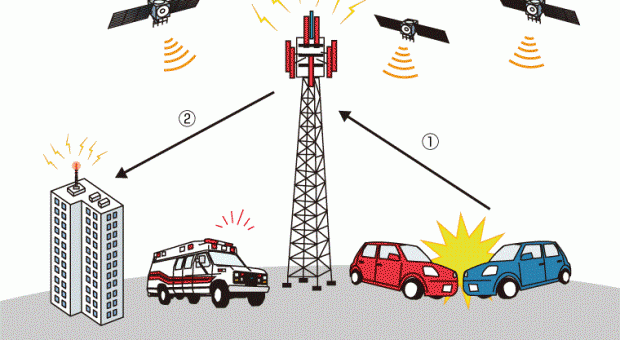
eCall: eCall is an initiative with the purpose to bring rapid assistance to motorists involved in a collision anywhere in the European Union
In case of a crash, an eCall-equipped car automatically calls the nearest emergency centre. Even if no passenger is able to speak, e.g. due to injuries, a ‘Minimum Set of Data’ is sent, which includes the exact location of the crash site. Shortly after the accident, emergency services therefore know that there has been an accident, and where exactly.
eCall cuts emergency services response time. It goes down to 50% in the countryside and 60% in built-up areas. The quicker response will save hundreds of lives in the EU every year.
The severity of injuries will be considerably reduced in tens of thousands of cases. You can also make an eCall by pushing a button inside the car. Witnessing an accident, you can thus report it and automatically give the precise location. As eCall normally ‘sleeps’, it does not allow vehicle tracking outside emergencies.
The objectve is to have this system seamlessly functioning throughout Europe by 2015, with the coordination of Member States, car manufacturers, telecom operators and emergency centres.
eCall: automated emergency call for road accidents mandatory in cars from 2015
To help mitigate the consequences of serious road accidents across the EU, today the European Commission adopted two proposals to ensure that, by October 2015, cars will automatically call emergency services in case of a serious crash. The “eCall” system automatically dials 112 – Europe’s single emergency number – in the event of a serious accident.
It communicates the vehicle’s location to emergency services, even if the driver is unconscious or unable to make a phone call. It is estimated that it could save up to 2500 lives a year
This draft legislation will ensure that from October 2015, all new models of passenger cars and light duty vehicles would be fitted with 112 eCall and the necessary infrastructure would be created for the proper receipt and handling of eCalls in emergency call response centres – ensuring the compatibility, interoperability and continuity of the EU-wide eCall service.
The data received through the eCall system will allow emergency services to provide assistance to vehicle drivers and passengers more quickly, thus helping to save lives and to treat injuries rapidly. Estimates suggest that eCall could speed up emergency response times by 40% in urban areas and 50% in the countryside, and save up to 2500 lives a year.
In addition to the road safety benefits, eCall will also have a significant impact on reducing the congestion caused by traffic accidents and on reducing secondary accidents caused by unsecured accident sites.
Industry also benefits via the many companies that are involved in the delivery of technologies, components and services used in different aspects of eCall including in-vehicle systems, wireless data delivery, and public safety answering point systems. Moreover, it is expected that the in-vehicle equipment introduced by eCall could be used for additional added value services (such as the tracking of stolen cars).
How eCall works
eCall is activated automatically as soon as in-vehicle sensors detect a serious crash. Once set off, the system dials the European emergency number 112, establishes a telephone link to the appropriate emergency call centre and sends details of the accident to the rescue services, including the time of incident, the accurate position of the crashed vehicle and the direction of travel (most important on motorways and in tunnels). An eCall can also be triggered manually by pushing a button in the car, for example by a witness to a serious accident.
Source, please read more.
















